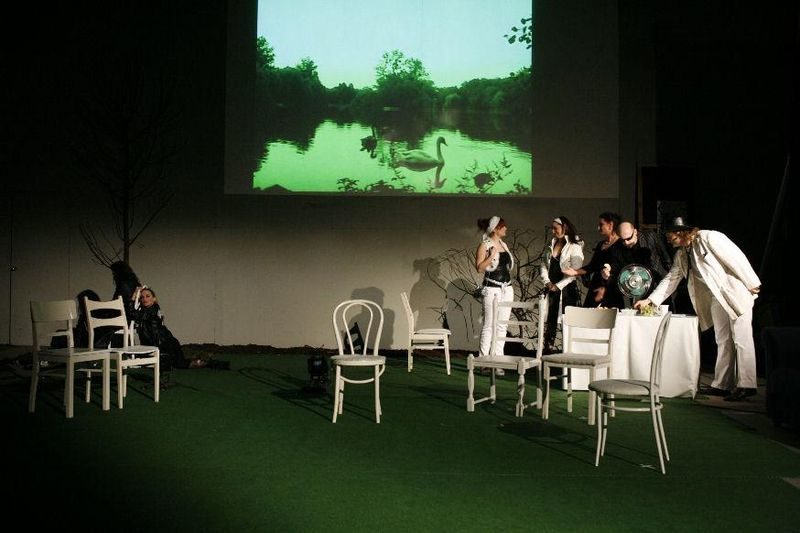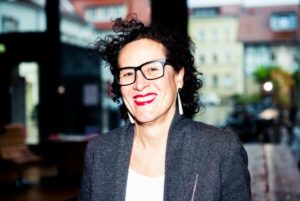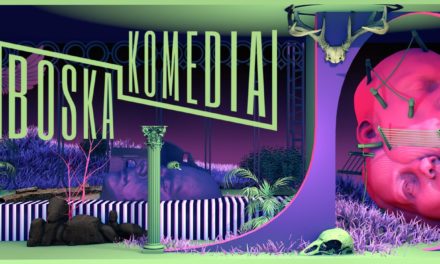Knowing literature inside out, developing the repertoire, making translations…the list of skills dramaturges have to have is long. On the occasion of this year’s awards ceremony of the Marie Zimmermann fellowship for dramaturgy at Akademie Schloss Solitude, Elisabeth Schweeger, artistic director of the Academy for Performing Arts, Ludwigsburg, gave a lecture on the role of dramaturges and how to educate them. We are happy to share the full lecture in an English translation on Schlosspost. Find the German version here.
Forgive me for subsequently using exclusively the feminine form. I hope the men will not hold it against me as they are obviously likewise considered (a small historical turnaround).
Dramaturgy: a broad field. When I ran the Frankfurter Schauspiel, I had a great many dramaturgs. Ten of them, each one of them a peculiarity. Together, in a team, they were the stubborn think tank such a big theater needs.
I have briefly recapitulated for myself what dramaturgy has to provide, and what skills I would expect in order to employ a dramaturg. The list became very long:
- Knowing literature inside out. Not only the plays, but also novels, poetry, secondary literature, trashy literature, popular literature …
- Exhibiting historical knowledge
- Making versions
- Making translations
- Developing the repertoire
- Co-developing ensembles
- Knowing the other art forms: films, TV, visual art, performance, music, dance
- Bringing artists with them: directors, actors, stage designers, musicians, amongst others …
- Knowing the German-speaking theater scene
- Having a network
- Knowing the international theater scene
- Knowing all of the publishers and their editors
- Knowing contract law and copyright law
- Having the ability to organize
- Taking responsibility for the budgets and being able to read them
- Finding or proposing cooperation opportunities and sponsoring partners
- Being an intermediary both inside and outside, loving the audience, including them
- Having pedagogical abilities
- Working integratively into the ensemble
- Being a team player
- Writing press releases, being informed in terms of promotion, and having graphic knowledge
- Preparing and leading readings and discussions
- Developing concepts with the directors
- Making production dramaturgy
- Being a psychologist and a comforter not only for actors, directors, stage, and costume designers, but also for artistic directors, journalists, and politicians
- Being able to discuss issues, to take criticism, and to be a skeptic
- Having political awareness, knowing about current relevant questions
- Allowing chaos
- In addition, she simply has to be human, loving, a loving critic and observer
- … and also a fanatic
Otherwise, she could not do all of this.
The dramaturg is, therefore, an all-rounder, a phenomenon really, because one person can hardly do all of this alone. Included in this are at least ten different job descriptions and still the dramaturge has to bring along this comprehensive knowledge in current theater. Simply because of knowing her own limits and where the consultation of another person could provide relief and teamwork is a real opportunity.
Dramaturgs are intermediaries and multitaskers, the linchpin.
The job description of a dramaturg has changed rapidly in the last few decades. Historically, the dramaturg – only male in the past – was someone merely writing for the theater and being a literarily well-versed advisor to the theater management at first.
Later, with dramaturgs such as Horst Laube and even later Marie Zimmermann, the job description broadened. It included the confrontation with other art forms and moved the dramaturgs closer to the production. They became an integral part of the theater management. With critical distance, they should, on the one hand, take a look at the production, artistic intention, and development, while on the other hand, represent the demands of social and political contexts both within the theater and externally. The dramaturg is a critical intermediary through and through. An intermediary between socially relevant topics and artistic dreams, between authors and directors, between production and technology, between production and the public. The dramaturg is a scout who should find various talents that simultaneously create promising and socially relevant repertoire politics and thereby also has the highest degree of responsibility for the spending of public funds. The dramaturg should create safe spaces for creative processes, but also be able to conduct contract negotiations with artists, publishers, and other partners. The dramaturg is equally responsible for the appeal of the theater (for example, content and advertising strategies), for the big picture as well as for the satisfaction of all of the employees (for example, for information and maximum transparency of all the decisions and optimal employment policy). The dramaturg directly participates in the rehearsal process through the proposal of a play/project to the assigning to a director or an artistic management team, the development of a concept, the casting of actors, etc. She supervises the production far beyond the premiere. Furthermore, she will coordinate the production processes, calculate the costs, create links and networks, while at the same time being the assertive production manager and the understanding psychologist who has an open ear for all kinds of problems and difficulties and can give advice.
In summary, the everyday working life of a dramaturg means excessive demand. And that has to happen with passion because everything needs to be done at the same time but still, she is, above all, the contributor, the enabler, the counselor and at best the obstetrician of a theater event.
In summary, the everyday working life of a dramaturg means excessive demand. And that has to happen with a passion because everything needs to be done at the same time but still, she is, above all, the contributor, the enabler, the counselor and at best the obstetrician of a theater event. For this, the others receive the applause. Nevertheless, being a dramaturg is the most diverse, challenging, and beautiful job because she constantly has to deal with different people and very different tasks and subjects. The dramaturg can set the direction in order to overcome social and/or artistic borders together. To accomplish this all, a dramaturge needs, besides the knowledge of a specialist, above all the basic virtues of any artist: to be curious, to read, to look, to think, to listen, to talk, to ask questions, to doubt, to create contradiction, and to be able to write and have the courage to use her mind independently. In addition, she has to be in a position to work in and with teams.
What does the education in this field have to pay attention to? It has to be future-oriented and interdisciplinary, to take account of the far-reaching changes in the fields of dramaturgy and theater, to stimulate courage to contradict and to think differently. The education has to try to get to know and to command the craft through practical exercises in as many requirement profiles as possible and also to examine and question theory in immediate application. In the end, the soon-to-be dramaturg should know how to transfer relevant topics, aesthetics, and structures from the reality surrounding us into artistic productions. She should have received basic knowledge and insights into the possibilities and obligations of the theater management, to be in a position to ideally not only act in a reflective manner but also, a projecting one. And most of all, the dramaturg should be able to look beyond the theater genre’s nose.
She should not learn what is not possible, but to develop ideas how it is possible. Therefore, an education in dramaturgy not only has to teach study contents that prepare dramaturgs for already existing theater life, but also for still unknown, future theater. Besides the knowledge of existing theater work and its conditions, the political sense of responsibility and social fantasy has to be stimulated, the knowledge of other artistic possibilities expanded, and the sensibility for the unconventional and unknown sharpened. Also, the ability to clarify terms and being willing to enforce it against the economic and political obstacles of the company and society.
However, to know something in theory does not really help. In order to deepen the theoretic knowledge, the main focus of the education has to be on enabling the application and connection of what is learned with practical work experience and work processes. This means that young dramaturgs have to be integrated into artistic projects as fast as possible, sometimes also letting them participate at theaters or other artistic institutions outside. Early discussion with other artists and institutions within the framework of their own productions enables them during their training period to form powerful artistic teams for the future and to enable vital networking.
The vision should be to train and prepare dramaturgs for meeting new requirements for the theater together in order to discover or invent new, contemporary forms of theater.
The vision should be to train and prepare dramaturgs for meeting new requirements for the theater together in order to discover or invent new, contemporary forms of theater. The dramaturgs thereby embody a conception of man that is inherent to theater – and is essentially still committed to a humanistic thought that man is a universe and that what surrounds him and what he achieves belongs inevitably to him and has to be considered. Humility is a central part of the job. In combination with the ability of discourse and therefore of a constructive culture of dispute as an essential instrument of action, the theater can be recognized as immanently socially relevant and developed further.
In his book Die Reise nach Armenien, Ossip Mandelstam has talked about the eye being an instrument of thought, a light being a force, and ornament being thought. His book is about “friendship, science, intellectual passion and not about things.” One has to “always travel, and not only to Armenia and Tajikistan.” “The highest honor for an artist« would be »to bring those to action who think and feel differently than him.” And he adds: “But my eye, obsessed with everything strange, ephemeral and rapidly elapsing, has only captured the enlightening trembling of the contingencies, the floral ornament of reality on its journey.”
Dramaturgs could put the motto of the job first. Not being an artist, but a traveler with artistic sensitivity in order to capture the shaky reality, to question, understand, convey, and marvel.
Thank you for your attention and congratulations to the award winner …
This article was originally posted at Schloss-post.com. Reposted with permission. Read the original article.
This post was written by the author in their personal capacity.The opinions expressed in this article are the author’s own and do not reflect the view of The Theatre Times, their staff or collaborators.
This post was written by Elisabeth Schweeger.
The views expressed here belong to the author and do not necessarily reflect our views and opinions.



















